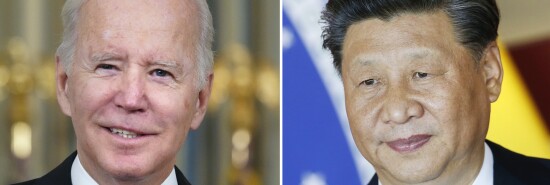
Four key things Biden should say to Xi
Tom Rogan
Video Embed
President Joe Biden will meet President Xi Jinping of China just outside of San Francisco on Wednesday. The much-anticipated meeting comes on the sidelines of the Asia-Pacific Economic Cooperation summit. The nature of the Chinese Communist system and Xi’s escalating paranoia mean that leader-to-leader exchanges are of crucial value. Biden’s priority should be to disabuse Xi of his misconceptions about U.S. policy.
Yes, the United States and China have major disagreements on certain topics. Yes, they have fundamentally divergent aspirations for the future of global political order. But it would be foolish to stumble into economic, political, and military conflicts where fragile balances might otherwise be found. In turn, here are four key points Biden should make to Xi.
BIDEN-XI MEETING HAS REPERCUSSIONS AT HOME AHEAD OF ELECTION: ‘THE US HAS ENOUGH ON ITS PLATE’
1.) Technology restrictions do not seek a diminished China, only China’s diminished means of hurting America
China has been infuriated and alarmed by U.S. technology restrictions in areas such as artificial intelligence and semiconductor chips. Beijing believes these restrictions seek to give the U.S. an unfair economic advantage. In reality, the U.S. is concerned by China’s use of these technologies for two purposes.
First, there is the concern about industrialized intellectual property theft, which allows Beijing to reproduce at far lower cost than what U.S. and Western manufacturers have spent hundreds of billions of dollars developing. To accept China’s endemic intellectual property theft is to accept the end of the free market rule of law — in other words, to accept the global capitalist economy’s implosion.
The second motive for U.S. technology restrictions is to prevent these technologies from being used to strengthen the People’s Liberation Army. Considering the escalation of U.S.-China military tensions in the East and South China Seas, this is no small concern. And China has made great use of Western technology, including from close U.S. allies such as Israel, to improve its weapons and sensor targeting capabilities. This is a great concern in terms of anti-ship ballistic missile forces and the PLA’s mastery of what is known as the “kill chain” (targeting-launching-evading countermeasures-killing). The survival of American service personnel and the prospect of U.S. victory in any future war depend on these restrictions.
Where these and intellectual property factors are not affected, Biden should make clear that he welcomes China’s import of Western technologies.
2.) The U.S. will defend its treaty allies and hold China accountable for ‘accidents’ affecting U.S. military personnel
Chinese coast guard vessels are now regularly firing water cannons and deliberately colliding with vessels from the Philippines. They are doing so well within the Philippines’s exclusive economic zone. This intimidation serves Beijing’s blatantly imperial agenda of dominating the near entirety of the South China Sea. Biden should thus hold firm on his prior clarity. He should warn Xi that any Chinese attack on the Philippines, a U.S. treaty defense ally, including Chinese efforts to prevent the replenishment or replacement of the BRP Sierra Madre, will result in U.S. military action.
Biden should also clarify that China’s refusal to participate in substantive military-to-military deconfliction talks does not excuse it of responsibility for dangerous military interactions. Increasingly risky PLA intercepts of U.S. forces in international airspace are threatening U.S. lives. Biden should warn that if an accident does occur for which PLA forces are responsible, the U.S. will hold accountable (including by the use of follow-on military force) those responsible. This understanding matters because Beijing evidently believes it can use these intercepts as a deniable means of driving the U.S. out of the South China Sea.
Xi must not assume that any future accident will lead to a repeat of the 2002 Hainan Island collision. In that case, a U.S. aircrew was released only after the U.S. apologized for a Chinese pilot’s mistake.
3.) The U.S. seeks the status quo with Taiwan-China relations
While the U.S. is increasing its support for Taiwan, Taipei’s utter failure to prepare for war shows that neither it nor the U.S. seeks Taiwan’s formal independence from China (Xi’s certain red line). Biden should thus clarify that while he seeks the status quo, escalating PLA activities near Taiwan make that status quo harder to maintain. If some of those PLA activities decline, Biden should offer to decline some (but not all) U.S. military activities near Taiwan in reciprocity.
4.) Re-establishing trust means working together where possible, not tying all issues together
When it comes to U.S. relations, the Chinese Communist Party’s overarching strategy is to link all matters in pursuit of a grand bargain. Beijing hopes this will enable it to use distinct areas of mutually beneficial cooperation (such as carbon emission reductions) as levers with which to extract U.S. concessions in other areas, including tariffs and export restrictions (a la point 1). But because these topics are not linked and cannot be linked, Beijing’s strategy only complicates room for progress in any one area. It then leaves Beijing to screech about lost opportunities for “win-win cooperation” and the U.S. to respond with more hawkish China policies. Neither side benefits.
In sum, Biden and Xi can agree on little. But that needn’t mean they avoid finding difficult balancing acts on some issues — or even finding tentative agreement on a very few.
